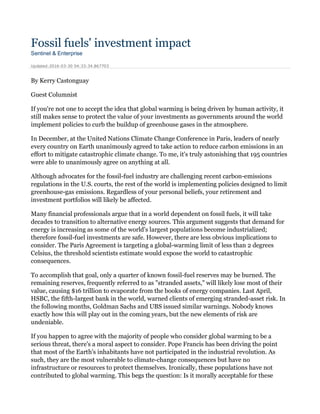Fossil fuels' investment impact - Sentinel & Enterprise
•
1 gefällt mir•39 views
Nearly every country agreed at the UN Climate Change Conference to take action to reduce carbon emissions and limit global warming to under 2 degrees Celsius. However, this will mean that only 25% of known fossil fuel reserves can be burned, leaving the remaining 75% as "stranded assets" that will lose most of their value and cause $16 trillion to evaporate from energy company books. As governments implement policies to curb emissions, investments in fossil fuel companies face new risks that could affect retirement funds and portfolios. Financial institutions are warning clients about this emerging stranded asset risk.
Melden
Teilen
Melden
Teilen
Downloaden Sie, um offline zu lesen

Empfohlen
Empfohlen
Weitere ähnliche Inhalte
Was ist angesagt?
Was ist angesagt? (11)
Carbon bubble, oil decline and the shared value opportunity
for logistics

Carbon bubble, oil decline and the shared value opportunity
for logistics
Ähnlich wie Fossil fuels' investment impact - Sentinel & Enterprise
Ähnlich wie Fossil fuels' investment impact - Sentinel & Enterprise (20)
Saving The Environment - Business News (advanced) .pdf

Saving The Environment - Business News (advanced) .pdf
Business_English_Article_Saving_the_Environment_Advanced_.pdf

Business_English_Article_Saving_the_Environment_Advanced_.pdf
Business_English_Article_Saving_The_Environment_Intermediate_.pdf

Business_English_Article_Saving_The_Environment_Intermediate_.pdf
Saving The Environment - Business News (intermediate) .pdf

Saving The Environment - Business News (intermediate) .pdf
The Adam Smith Plan to Save Markets and the Climate: The Climate is Too Big t...

The Adam Smith Plan to Save Markets and the Climate: The Climate is Too Big t...
Scanned by CamScannerFree exchangeEconomicsThe.docx

Scanned by CamScannerFree exchangeEconomicsThe.docx
TennisonJ_Interdisciplinary Research Paper_Climate Change 13 Mar 16 (Autosaved)

TennisonJ_Interdisciplinary Research Paper_Climate Change 13 Mar 16 (Autosaved)
Letter by Parliamentarians US Congress and EU on COP28 Presidency

Letter by Parliamentarians US Congress and EU on COP28 Presidency
Socialists And Environmentalists What Do We Have In Common

Socialists And Environmentalists What Do We Have In Common
Fossil fuels' investment impact - Sentinel & Enterprise
- 1. Fossil fuels' investment impact Sentinel & Enterprise Updated:2016-03-30 04:33:34.867703 By Kerry Castonguay Guest Columnist If you're not one to accept the idea that global warming is being driven by human activity, it still makes sense to protect the value of your investments as governments around the world implement policies to curb the buildup of greenhouse gases in the atmosphere. In December, at the United Nations Climate Change Conference in Paris, leaders of nearly every country on Earth unanimously agreed to take action to reduce carbon emissions in an effort to mitigate catastrophic climate change. To me, it's truly astonishing that 195 countries were able to unanimously agree on anything at all. Although advocates for the fossil-fuel industry are challenging recent carbon-emissions regulations in the U.S. courts, the rest of the world is implementing policies designed to limit greenhouse-gas emissions. Regardless of your personal beliefs, your retirement and investment portfolios will likely be affected. Many financial professionals argue that in a world dependent on fossil fuels, it will take decades to transition to alternative energy sources. This argument suggests that demand for energy is increasing as some of the world's largest populations become industrialized; therefore fossil-fuel investments are safe. However, there are less obvious implications to consider. The Paris Agreement is targeting a global-warming limit of less than 2 degrees Celsius, the threshold scientists estimate would expose the world to catastrophic consequences. To accomplish that goal, only a quarter of known fossil-fuel reserves may be burned. The remaining reserves, frequently referred to as "stranded assets," will likely lose most of their value, causing $16 trillion to evaporate from the books of energy companies. Last April, HSBC, the fifth-largest bank in the world, warned clients of emerging stranded-asset risk. In the following months, Goldman Sachs and UBS issued similar warnings. Nobody knows exactly how this will play out in the coming years, but the new elements of risk are undeniable. If you happen to agree with the majority of people who consider global warming to be a serious threat, there's a moral aspect to consider. Pope Francis has been driving the point that most of the Earth's inhabitants have not participated in the industrial revolution. As such, they are the most vulnerable to climate-change consequences but have no infrastructure or resources to protect themselves. Ironically, these populations have not contributed to global warming. This begs the question: Is it morally acceptable for these
- 2. billions of people to suffer and perish so that industrialized nations can maintain a comparatively wealthy lifestyle for a few more decades? If you're involved with a nonprofit or a benevolent organization that has an endowment or other investments, two more questions merit consideration: Does your organization accept global-warming science? If so, is it ethical to profit from investment in fossil-fuel companies that will ultimately cause suffering and destruction? Hundreds of institutions have announced their plans to divest from fossil fuels. To investigate whether divestment makes sense for your situation, you may want to consult with a financial adviser who specializes in sustainable and responsible investment strategies. If you make your own financial decisions, there are many online resources that can provide guidance. A good start is www.fossilfreefunds.org. Whether you believe global warming is a legitimate threat or a political hoax, your financial well-being is at stake. Kerry Castonguay is a resident of Leominster and a partner at Chestnut Hill Wealth Management Group. Close Window Send To Printer
